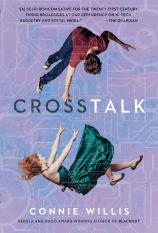Crosstalk
Review
Crosstalk
“Life moves pretty fast,” Matthew Broderick told movie audiences back in 1986. “If you don't stop and look around once in a while, you could miss it.” And that, ladies and gentlemen, was 30 years ago, in an era when computers had huge monitors with monochrome displays, when cell phones were rare and exotic items, when text messages and smartphones and tablet computers and online book reviews were things only dimly imagined, at that. Life was already plenty fast in 1986 (especially if, like Ferris Bueller, you had access to a classic Ferrari); it is exponentially faster, more complex and so much more distracting than it ever was.
Distraction is so much a part of Connie Willis’ CROSSTALK that one is tempted to say that it should be considered a supporting character on its own. If the actual main character, Briddey Flannigan, was any more distracted, she would be in her very own Brian De Palma movie. Everything is hitting Briddey all at once --- her job at a smartphone company locked in a desperate struggle to get ahead of Apple in the technology game, her improbably nosy and intrusive co-workers, and her impossibly nosy and intrusive Irish family. The one island of stability that she should have is her boyfriend, and he introduces just as much distraction and chaos as anyone. Briddey’s life is lived at a pace that would reduce most people to a quivering, twitching mess. However, the most amazing thing about this is not that she has largely adapted to it, but that she seems to be under the impression that this is normal, the way things ought to be.
"Just as the plot demands the reader’s attention, the relentlessness of the prose style threatens to deflect it away. It is a testament to Willis’ strengths as an author that the book still manages to be engaging, and funny, despite its undeniably frenetic and manic nature."
You might think that some things, even in a hyper-connected world, ought to take some time. You would be right, and romance would definitely be one of them. But in Briddey’s universe, romance can be sped up through a revolutionary brain implant that allows a couple in love to communicate their feelings directly, electronically, instead of using boring old flowers and chocolate and Hallmark cards. The technology is described in the most positive, glowing terms possible, so you know immediately that something is up, whatever that may be. (As I am writing this review, a Dallas Cowboys wide receiver just dropped a sure-thing touchdown pass; suffice it to say that I wouldn’t want to communicate my very own personal thoughts and feelings at this moment to anyone, much less my significant other.)
It would be cheating to say, specifically, what happens to poor Briddey Flannigan, except to say that she does in fact end up a twitching mess on the floor at one point, as you’d expect. The plot of CROSSTALK is just as twisty as its language, and the structure is choppy; this is a book that demands that you pay attention to what is going on. And Willis’ readers --- especially those who remember the iconic "Bishop's bird stump" from TO SAY NOTHING OF THE DOG --- know that she does not have any issues preventing her from hiding the ball from the reader for most of the story.
There are a few small places in CROSSTALK where the narrative slows a little bit, and the reader is allowed to catch her breath, but not many. The book reads at times like it was meant to be read in text-message format, with little bursts of emotion, plot and dialogue coming at the reader every few seconds. This is almost certainly deliberate, with Willis adopting a breathless, choppy style to emulate the disorienting nature of modern life and where she thinks that it is going (that is to say, nowhere good). Just as the plot demands the reader’s attention, the relentlessness of the prose style threatens to deflect it away. It is a testament to Willis’ strengths as an author that the book still manages to be engaging, and funny, despite its undeniably frenetic and manic nature.
Many of Willis’ books begin in the not-too-distant near future of the 21st century, and then drop back into the past. CROSSTALK (subtracting a goodly amount of historical factoids and what seems to be Willis’ encyclopedic knowledge of 20th-century show tunes) takes place entirely in the near-now, and as such is a product of real-world anxiety about where our technologies are leading us. Anyone who shares that anxiety will find this novel to be a welcome read, if not always a congenial one.
Reviewed by Curtis Edmonds on November 4, 2016
Crosstalk
- Publication Date: August 1, 2017
- Genres: Fiction, Humor, Romance, Science Fiction
- Paperback: 512 pages
- Publisher: Del Rey
- ISBN-10: 0345540697
- ISBN-13: 9780345540690





